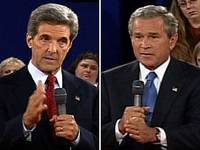Debate About Debates: EdWonk Picks The Winner!
Let The Punditry Begin!
 President Bush and Senator Kerry met for the second time in as many weeks in St. Louis, Missouri. As with the previous meeting between the candidates, tonight's encounter did not produce any clear-cut winner. However, because the "conditions of victory" for each candidate were somewhat different, it is possible to make a strong case that one candidate did indeed prevail. In an initial poll (CNN) is indicating that Kerry scored a marginal victory. The EdWonk disagrees with that assessment, and believes that President Bush was the victor, but not in the traditional manner normally associated with winning a debate.
President Bush and Senator Kerry met for the second time in as many weeks in St. Louis, Missouri. As with the previous meeting between the candidates, tonight's encounter did not produce any clear-cut winner. However, because the "conditions of victory" for each candidate were somewhat different, it is possible to make a strong case that one candidate did indeed prevail. In an initial poll (CNN) is indicating that Kerry scored a marginal victory. The EdWonk disagrees with that assessment, and believes that President Bush was the victor, but not in the traditional manner normally associated with winning a debate.
In order to win this debate (and affect the election) the EdWonk asserts that John Kerry needed to score a "knock-out" of his opponent. And Kerry did not score that knockout. It is not good enough that Kerry appears to be "presidential," "win on style," or "win on substance." All of that does not matter, unless Bush has a disastrous performance. And that did not happen.
Kerry must demonstrate to the satisfaction of voters in the battleground states that President Bush must go. The EdWonk is convinced that it is highly unlikely that Kerry's performance persuaded enough of the few remaining undecided voters in the battleground states to cast their ballots for him. For that reason, the electoral map did not change a bit due to this debate. Bush will continue to enjoy a lead in those states that can deliver the vote that counts, the Electoral College.
Neither Bush nor Kerry delivered any "one-liners" that could be seen as a large boost for either campaign. Though Bush did humorously ask Kerry and the audience, "Need wood?"
Sadly, education was only mentioned briefly. Concerning The No Child Left Behind Act, Kerry said, "We must keep high standards and let teachers teach." Kerry also stated, "350 teachers have been laid-off here in St. Louis." (The EdWonk is certain that Kerry threw that as a "sop" to the teachers' unions, which are strongly pro-Kerry. And your EdWonk has some strong opinions regarding the endorsement of candidates by unions.)
But Kerry did make a statement that left him supremely vulnerable to attack by the Bush Campaign. And that moment came when Kerry was asked that if he had been President, would Saddam Hussein have been removed from power. Kerry responded, "Not necessarily." Even a political amateur such as your EdWonk could make much political hay of that.
As a rule, Americans do not usually replace incumbents with challengers. As evidence, we only have to examine the low turnover-rate in The United States Congress. Over 90% of Senate and House seats are considered to be "safe" for the incumbent, regardless of the qualifications that a challenger may have.
That is why control over the house and senate is so vigorously contested in the few Congressional Districts and Senate seats that are thought of as "competitive." This hesitation to replace incumbents can be found at national, state, and local levels.
But there is an exception to this tendency to re-elect incumbents. And that is when the electorate collectively feels that the incumbent no longer deserves to hold office due to some overwhelming reason. Felonious behavior, huge personal scandal, a terrible economy, or reversing a very publicly made campaign promise are all items that may imperil an incumbent in an election.
The issue that makes George Bush vulnerable is not the economy, nor is it the health care crisis. It is the War In Iraq. And here is where John Kerry doesn't stand a chance. Because of his Senate voting record, Kerry cannot present himself as an anti-war candidate and exploit the substantial anti-war feeling that is out there.
His best effort toward addressing the war issue is a "nebulous" plan that reminds your EdWonk of the "Secret Plan" of 1968 that Richard Nixon promoted (as a campaign ploy) to end the Vietnam War. But for Nixon, the gambit worked, as his anti-communist credentials were impeccable. Kerry's credentials as a war-leader are anything but credible.
Even though coalition losses in the war have been tragic, so far the American people have found them acceptable. This new American tolerance for war casualties has been considerably affected by the events of September 11, 2001, when the United States sustained 3000 war casualties.
To many people, President Bush's conduct of the war has been less than satisfactory. But a majority believe that Kerry would not have done as well as the President, thereby neutralizing Kerry's attempts to promote himself as an effective alternative to Bush as Commander In Chief.
Whatever advantages that Kerry might have had due to his military service have largely been counteracted by Swiftboat Veterans For Truth.
However, should American losses suddenly rise substantially just before the election, that could cause the balance to tip toward John Kerry in those crucial Battleground States.
Because John Kerry did not convince enough people that President Bush is not fit to be re-elected, he did not achieve his condition of victory in this debate. Bush might have given-up a little ground, but he is still in firm possession of the field.









<< Home